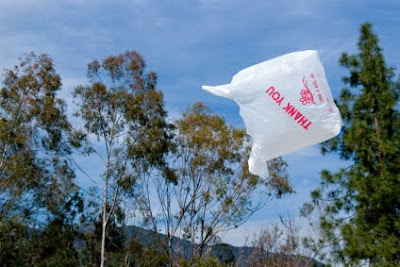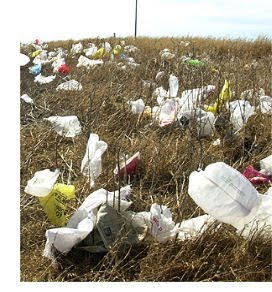
As you may know, California’s unique environmental laws have been used to staunch the tide of efforts to ban single-use plastic shopping bags. Essentially, money-grubbin’ plastics manufacturers have been suing municipalities that attempt to enact a bag ban - pretty much saying, “Up your nose with a rubber hose, suckers! We want the money more than you need to clean up your neighborhoods and oceans!”. Well, Green Cities California has produced something to assuage the $100,000-$300,000 cost of the lawsuits. It’s called a “Master Environmental Assessment” and can be shared across cities and counties that wish to enact a ban w/o the high cost of American Chemistry Council (plastics manufacturers) lawsuits. Here’s the announcement (WOO-HOO!):
==================
Dear Friend,
Today Green Cities California (GCC) released a Master Environmental Assessment (MEA) on the impacts of single-use and reusable bags.
The report - commissioned by GCC with the support and collaboration of multiple partners - was completed by ICF International. Set within the context of the California Environmental Quality Act, it will help jurisdictions prepare environmental impact reports, a critical step in the process to promote the use of reusable bags.
The MEA is available now for free on http://greencitiescalifornia.org/mea
Kind regards,
Carol Misseldine, Coordinator
Green Cities California
For Immediate Release
Contacts:
Carol Misseldine, Coordinator
Green Cities California (415)388-5273
Terry Rivasplata
ICF International
(916) 231-9537
Paper or Plastic? Neither!
New report will help cities promote reusable grocery bags
March 8, 2010 - Green Cities California (GCC) announced today the release of its Master Environmental Assessment (MEA) on Single Use and Reusable Bags. The MEA, commissioned by GCC and developed by ICF International’s Sacramento office, summarizes existing studies on the environmental impacts of single use plastic, paper, compostable and reusable bags, as well as the impacts of policy options such as fees and bans on bags.
“This is a first-of-its-kind comprehensive compilation of existing studies on bags aligned within the context of CEQA (California Environmental Quality Act), which makes it useful in the preparation of local Environmental Impact Reports (EIRs),” said Terry Rivasplata of ICF International.
“All Environmental Impact Reports must begin with a survey of existing scientific literature,” said Carol Misseldine. “For those jurisdictions that must prepare an EIR in order to adopt ordinances that promote the use of reusable bags, this MEA will provide essential assistance.”
The MEA reviewed studies that document environmental impacts from the use of all four types of bags studied, including greenhouse gas emissions, persistent litter problems, marine life impacts, water consumption and ozone formation. The report also examined the impact of fees and bans and noted that bag use drops dramatically - up to 90%—when stores charge for them.
Further studies referenced in the MEA indicate that reusable bags, on a per use basis, have substantially lower environmental impacts than single use bags. The study finds that even with a minimum of three uses, reusable bags can result in less atmospheric acidification, ground level ozone formation, water use, and greenhouse gas emissions.
“I’m getting calls from jurisdictions throughout California and even from other parts of the country interested in the information contained in this document,” said Misseldine. “There seems to be a lot of interest nationwide in reducing single bag use.”
“We’re not going to recycle our way to a sustainable society,” said Dean Kubani, GCC Steering Committee member and Director of Santa Monica’s Office of Sustainability. “We need to orient away from single use and towards durable products. We are confident that this report will provide the documentation local governments need to adopt policies that encourage the use of reusable bags and phase out single use bags.”
The full report, an executive summary and background information on the MEA will be available on Green Cities California’s website on Monday March 8th at www.greencitiescalifornia.org/mea.
